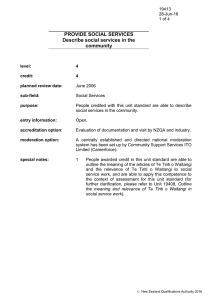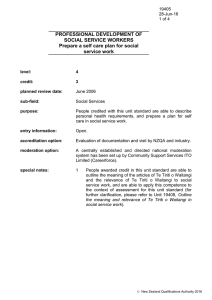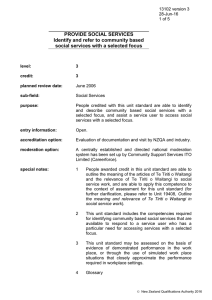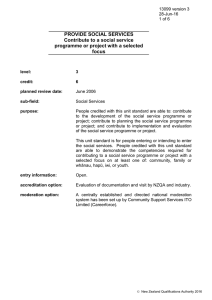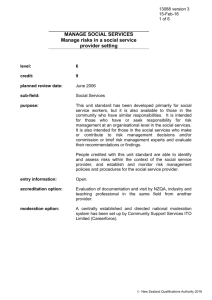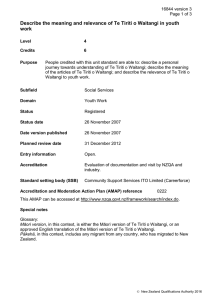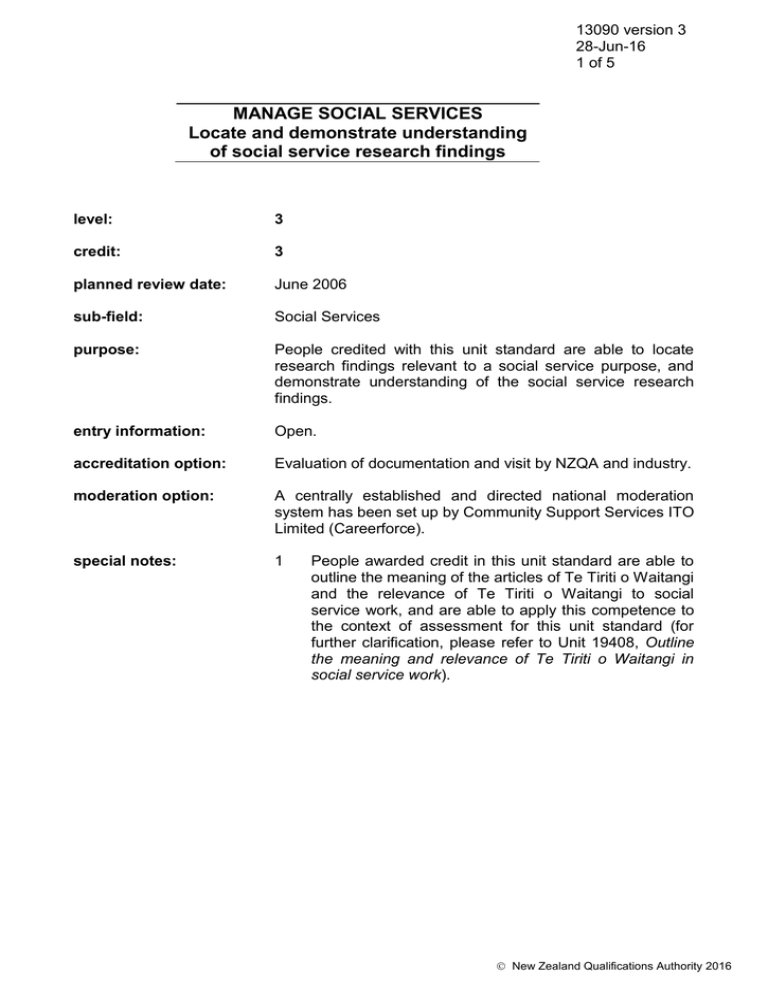
13090 version 3
28-Jun-16
1 of 5
MANAGE SOCIAL SERVICES
Locate and demonstrate understanding
of social service research findings
level:
3
credit:
3
planned review date:
June 2006
sub-field:
Social Services
purpose:
People credited with this unit standard are able to locate
research findings relevant to a social service purpose, and
demonstrate understanding of the social service research
findings.
entry information:
Open.
accreditation option:
Evaluation of documentation and visit by NZQA and industry.
moderation option:
A centrally established and directed national moderation
system has been set up by Community Support Services ITO
Limited (Careerforce).
special notes:
1
People awarded credit in this unit standard are able to
outline the meaning of the articles of Te Tiriti o Waitangi
and the relevance of Te Tiriti o Waitangi to social
service work, and are able to apply this competence to
the context of assessment for this unit standard (for
further clarification, please refer to Unit 19408, Outline
the meaning and relevance of Te Tiriti o Waitangi in
social service work).
New Zealand Qualifications Authority 2016
13090 version 3
28-Jun-16
2 of 5
MANAGE SOCIAL SERVICES
Locate and demonstrate understanding
of social service research findings
2
Glossary
Purpose for social service research may be any one of
description, development, explanation, or evaluation of:
social service concerns, issues, or needs, social service
theory, social service practice effectiveness, or social
service policy, programmes, services, or structures.
One purpose for social service research is required for
award of credit in this unit standard, from any
combination of these factors.
Social service concerns, issues, or needs may include
but are not limited to any of: alternative care,
community issues, criminal justice, disabilities,
economic development, employment, environmental
issues, families and whānau, health care, housing and
land, human rights, iwi development, legal issues,
planning, poverty, psychiatric care, recreation, personal
safety, sexuality, social crisis and change, social policy
and services, social structures, alcohol and drug issues,
Te Tiriti o Waitangi relationships. Concerns, issues, or
needs may be cultural, economic, educational,
emotional, psychological, physical, spiritual, social,
structural, or political, or related to age, gender, or
sexual orientation.
Sources of completed research projects may include
but are not limited to: personal, service provider, or
social service network data bases and records;
professional journals, text books, and reference works;
publications of research agencies and organisations,
including Statistics New Zealand.
New Zealand Qualifications Authority 2016
13090 version 3
28-Jun-16
3 of 5
MANAGE SOCIAL SERVICES
Locate and demonstrate understanding
of social service research findings
3
Sources of criteria established by legislation, ethical
practice, and service provider guidelines may include
but are not limited to: Official Information Act 1982,
Privacy Act 1993, service provider codes of conduct,
codes of practice issued by the Privacy Commissioner,
social service codes of ethics, and service provider
guidelines, protocols, staff manuals, strategic plans,
kawa, or tikanga.
Elements and Performance Criteria
element 1
Locate research findings relevant to a social service purpose.
performance criteria
1.1
The purpose for social service research is defined in terms of a social service
concern, issue, or need.
1.2
Sources of completed research projects are identified according to relevance to
the defined purpose for social service research.
1.3
One completed research project is identified from sources of completed
research projects according to relevance to the defined purpose for social
service research.
New Zealand Qualifications Authority 2016
13090 version 3
28-Jun-16
4 of 5
MANAGE SOCIAL SERVICES
Locate and demonstrate understanding
of social service research findings
element 2
Demonstrate understanding of the social service research findings.
performance criteria
2.1
Research methods are identified and described in terms of those employed to
achieve the findings in the research project.
Range:
research methods include - formulation of research topic and
research statements, research design, identification of sources of
information, literature review, information gathering techniques,
recording of information, analysis of information, presentation of
research findings.
2.2
The findings of the research project are identified and summarised according to
their relevance to the defined purpose for social service research.
2.3
The findings of the research project are assessed in terms of their potential
value and application to the purpose for social service research.
New Zealand Qualifications Authority 2016
13090 version 3
28-Jun-16
5 of 5
MANAGE SOCIAL SERVICES
Locate and demonstrate understanding
of social service research findings
Comments to:
Careerforce
PO Box 2637
Wellington 6140
Please Note:
Providers must be accredited by the Qualifications Authority
before they can offer programmes of education and training
assessed against unit standards.
Accredited providers assessing against unit standards must
engage with the moderation system that applies to those unit
standards. [Please refer to relevant Plan ref: 0222]
New Zealand Qualifications Authority 2016

